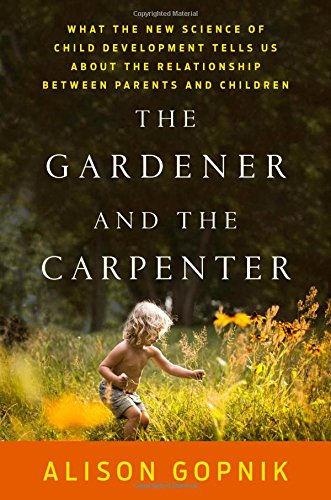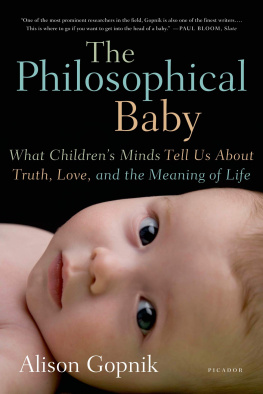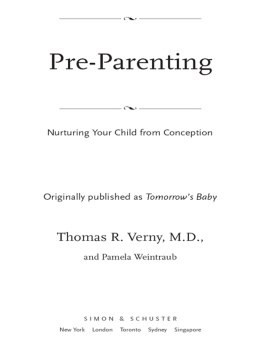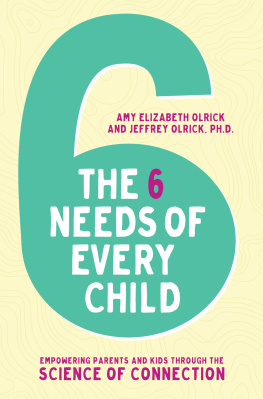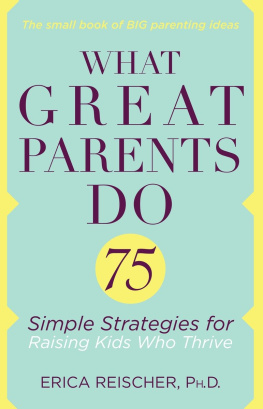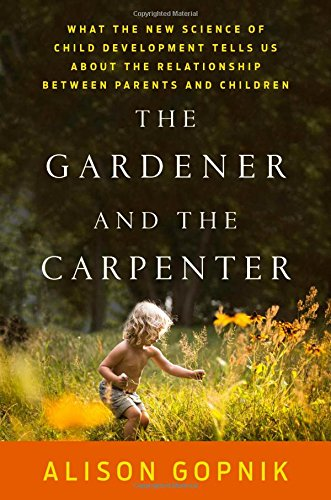Contents
Guide

The author and publisher have provided this e-book to you for your personal use only. You may not make this e-book publicly available in any way. Copyright infringement is against the law. If you believe the copy of this e-book you are reading infringes on the authors copyright, please notify the publisher at: us.macmillanusa.com/piracy.
For Pa Boot and Augustus, Georgiana, and Atticus, my late-life loves
Why be a parent? Taking care of children is demanding and exhausting, and yet for most of us it is also profoundly satisfying. Why? What makes it all worthwhile?
A common answer, especially for middle-class fathers and mothers today, is that you are a parent so that you can do something called parenting. To parent is a goal-directed verb; it describes a job, a kind of work. The goal is to somehow turn your child into a better or happier or more successful adultbetter than they would be otherwise, or (though we whisper this) better than the children next door. The right kind of parenting will produce the right kind of child, who in turn will become the right kind of adult.
Of course, people sometimes use the word parenting just to describe what parents actually do. But more often, especially now, parenting means something that parents should do. In this book, Ill argue that this prescriptive parenting picture is fundamentally misguided, from a scientific, philosophical, and political point of view, as well as a personal one. Its the wrong way to understand how parents and children actually think and act, and its equally wrong as a vision of how they should think and act. Its actually made life worse for children and parents, not better.
The parenting idea is so pervasive and seductive that it might seem self-evident, incontrovertible, and obvious. But at the same time that parents, most definitely including the parent writing this book, feel the pull of the parenting model, they also feel, often in an inchoate way, that there is something wrong about it. We simultaneously worry that our children are not doing well enough in school, and that they are suffering from the pressure to make them do well in school. We compare our children with the children of our friends and then feel despicable for doing it. We click on the latest headline praising or attacking some new parenting prescription and then say, perhaps a little too loudly, that we are actually just going to act on instinct after all.
Working to achieve a particular outcome is a good model for many crucial human enterprises. Its the right model for carpenters or writers or businessmen. You can judge whether you are a good carpenter or writer or CEO by the quality of your chairs, your books, or your bottom line. In the parenting picture, parenting follows the same model. A parent is a kind of carpenter; however, the goal is not to produce a particular kind of product, like a chair, but a particular kind of person.
In work, expertise leads to success. The promise of parenting is that there is some set of techniques, some particular expertise, that parents could acquire that would help them accomplish the goal of shaping their childrens lives. And a sizable industry has emerged that promises to provide exactly that expertise. Some sixty thousand books are in the parenting section on Amazon, and most of them have How to somewhere in the title.
Many of the parenting how-to books, of course, simply give practical advice about being a parent. But many more promise that if parents just practice the right techniques, they can make a substantial difference in the way their child turns out.
The parenting model isnt just something you find in how-to books, though. It shapes how people think about childrens development in general. Im a developmental psychologistI try to figure out what childrens minds are like and why they are like that. Even so, practically everyone who has ever interviewed me about the science of childhood has some question about what parents should do, and what the long-term effect of what they do will be.
The parenting idea is also a major source of grief for parentsespecially mothers. It helps fuel the never-ending mommy wars. If you accept the idea that parenting is a kind of work, then you must choose between that kind of work and other kinds of work (such as, for example, work). Mothers in particular become endlessly defensive and conflicted about whether it is possible to both successfully parent and successfully work at other jobs, and they feel forced to choose between de-emphasizing the importance of motherhood and forgoing their careers. But the same dilemmas affect fathers, all the more intensely because they are less acknowledged.
Partly as a result there is a countervailing impulse to devalue the importance of being a parenthence all the wry memoirs in which women self-consciously confess to their ambivalence about motherhood. After all, if being a parent is a kind of work aimed at creating a successful adult, its a pretty lousy joblong hours, nonexistent pay and benefits, and lots of heavy lifting. And for twenty years you have no idea if youve done it well, a fact that in and of itself would make the job nerve-racking and guilt-inducing. But if it isnt a kind of work, why do we do it? If the point is not to create a particular kind of adult, what is the point?
Im one of those anxious, middle-class working parents myself, and all my life Ive felt both the pull of the parenting model and the reaction against it. My three sons are all grown up, reasonably happy and successful, and starting to have children of their own. But I have also found myself perpetually assessing my responsibilityor should that be credit?for the ups and downs of their lives. Was I overprotective when I walked my youngest son to school every day when he was eight years old? Or was I neglectful when I didnt do the same when he turned nine? I wanted my children to follow their own paths and discover their own gifts. But should I have insisted that my oldest child finish college instead of trying to become a musician? I believedand still dothat good public schools are best for all children. But when my older kids were suffering at the local public high school, should I have sent them to a fancy private school in the suburbs, as I did with my youngest son? Should I have forced my youngest to turn off the computer and read, or should I have let him master coding? How could I have made sure that my gifted middle child had lots of free time to play, and did his homework, and at the same time went to an advanced math tutor and ballet classes? Hardest of all, I got divorced when my youngest child finished high school. Should I have done it sooner or later or not at all?
My professional expertise and knowledge about development has brought me no closer to answers than anybody else. Looking back on my nearly forty years as a parent, I suspect the best answer is that these are just the wrong questions.
Reflecting on your own experience as a parent may make you skeptical about parenting. But reflecting on other parents and children makes the parenting model look unsatisfactory, too. After all, the members of my generation, the happily cocooned and prosperous baby boomers, arent actually a dramatic improvement on our Greatest Generation parents who grew up in the miseries of depression and war. And we all know people with terrible childhoods who grow up to become wonderful grown-ups and loving parents themselves, and good parents who end up with tragically unhappy children.

